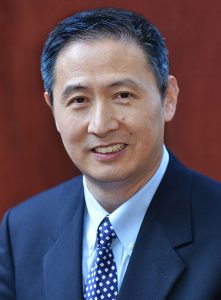
Cun-Yu Wang
Professor and Chair, Division of Oral Biology and Medicine; Associate Dean for Graduate Studies, and No-Hee Park Endowed Professor in Dentistry, School of Dentistry
Professor, Department of Bioengineering, School of Engineering
University of California at Los Angeles
Doctorate in Genetics and Molecular Biology, UNC-Chapel Hill
Cun-Yu Wang is the No-Hee Park Endowed Professor within the University of California at Los Angeles. He also serves as chair of the Division of Oral Biology and Medicine and the associate dean for graduate studies within UCLA’s School of Dentistry.
Wang received his dental medicine training from both Nanjing Medical University and Peking University. In 1990, he came to Forsyth Institute as a postdoctoral fellow to study oral inflammation and bone resorption. He then went to UNC-Chapel Hill for Dentist Scientist Career Transition Award training sponsored by National Institute of Dental and Craniofacial Research (NIDCR) in 1995 and received his Ph.D. in genetics and molecular biology from UNC-Chapel Hill in 1998. He joined the University of Michigan School of Dentistry as an associate professor in 1999 and was named the Richard H. Kingery Endowed Collegiate Professor in 2004. He joined the UCLA faculty in 2007.
Wang works in three major areas: molecular signaling and therapeutics of cancer, molecular regulation of oral and systemic inflammation and infection, and molecular and epigenetic control of adult stem cell properties and craniofacial regeneration.
His landmark discovery on the regulation of cancer cell death was cited as one of 10 important discoveries in 1996 by Science magazine. His work has been cited more than 15,000 times, including within Science, Cell, Cell Stem Cell, Cancer Cell, Nature Cell Biology and Nature Medicine. He has received numerous awards, including the National Institutes of Health (NIH) MERIT Award and the International Association for Dental Research Distinguished Scientist Award. He was the charter member of the NIDCR Board of Scientific Counselors. Wang actively promotes international collaborations in biomedical research between China and the United States. In 2011, he was elected to the National Academy of Medicine (formerly the Institute of Medicine), which is one of the highest honors in medicine and public health in the United States. In 2013, he was elected to the Chinese Academy of Engineering as a foreign member.
“Of course, work hard. … learn from and make friends with some ambitious postdoctoral fellows at your lab.”
Please share the factors and/or people that (who) inspired you to pursue your area of graduate study.
The UNC School of Dentistry has a wonderful reputation for training dentist scientists. There was an excellent interdisciplinary program that allowed me to do my specialty training in the dental school and my Ph.D. training in the medical school. Drs. James Bawden, Martin Trope and John Stamm were key persons who inspired me to do my graduate studies. Al Baldwin, my Ph.D. mentor, gave me the flexible time to work on both clinic and lab and guided me through my Ph.D. studies.
Please describe your favorite memories as a graduate student at UNC-Chapel Hill.
Many things. I like the tradition of our Curriculum in Genetics and Molecular Biology Program. The senior students always helped to take care of incoming students, such as having a drink or dinner together at Carrboro to welcome new students.
What aspects of your graduate studies are most useful in your current professional role?
Basic training in cellular and molecular biology and genetics. The professors for our core courses were amazing and outstanding, but they were rigid and tough. They taught us how to read important literatures and how to think critically.
Please describe the most significant aspects of your work.
When I was a graduate student here, I was lucky and made a landmark discovery on the inhibition of cell death by NF-kB. It gave me a career. I am interested in so many different things, from gum diseases, adult stem cells, and bone to cancer metastasis. My recent works on epigenetic control of adult stem cell fate and the regulation of cancer metastasis, bone metabolism and osteoporosis by NF-kB also have received some attention. I am still waiting for the most significant work to appear.
Do you have advice for current UNC-Chapel Hill graduate students?
Of course, work hard. Be ambitious and have an open mind by keeping up with most updated literatures. Identify the best and most productive lab to do your thesis work. However, it is important not to be selfish. Try to learn from and make friends with some ambitious postdoctoral fellows at your lab. Back to old days, two fellows, Drs. Marty Mayo and Denis Guttridge, really taught me a lot of things. Marty taught me how to write a good grant application.
